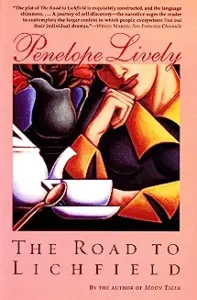The Road to Lichfield by Penelope Lively 1977
Penelope Lively is simply one of my very favorite writers. A British novelist who turned 90 this year, she has written more than 30 children’s books, more than 20 novels and short story collections, and four non-fiction books. I’ve read several of the novels and non-fiction collections and loved every one of them.
‘The Road to Lichfield’ was her first novel, published in 1977 and short-listed for the Booker Prize. Two subsequent novels were similarly listed and ‘Moon Tiger’ won both the Booker in 1987 and the Best Booker Winner of the Decade of the ’80’s.
Lively writes with an agile style and brilliant sense of time, both historical time and the quotidian passing of the hours each day. In ‘The Road to Lichfield’ both of those time senses are there in her very first novel. Anne Linton, forty years old, married since 19 and the mother of two children, a teacher of history at the local comprehensive school, and an active member of several community action groups, finds herself traveling 3 hours north from Cuxing in Berkshire to Lichfield where her aged father is dying in a nursing home. During one of these visits, she encounters David Fairfield, a history teacher, married, father of two, who was a fishing friend of her father’s and who is returning his fishing rod to his home when he meets Anne. The dance of their developing love affair is as tense and engaging as any thriller and so is the end of that affair.
In the background to this central plot is the issue of history and time itself. Anne is engaged in an attempt to save Splatt’s Cottage, the oldest house in her village and the object of a developer’s bulldozers, and we learn about the cottage’s past 200 years. Both she and David teach history and have conversations about its importance. Anne is sacked by the new principal of her school who devalues history and what it has to teach us. Anne’s father in his moments of consciousness relives episodes in his life, and perhaps most telling in terms of what the ‘truth’ of the past is and what it can teach us is Anne’s discovery of her father’s long time relationship with another woman and he child. Time, truth, history, the present—Lively mixes them all together in a heady brew.
Lively writes wonderfully from descriptions of English villages to those of individuals, and the book was one of those that I couldn’t wait to return to every time I put it down. Read this one, ‘Moon Tiger’, and any of her other works that you can find. I managed to find three of them in a cardboard box at the Woodstock, Vermont Bookstock weekend and can’t wait to wade into them down the road.



